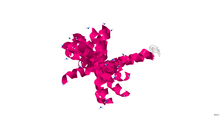Cecropin
Cecropins are antimicrobial peptides.[1][2] They were first isolated from the hemolymph of Hyalophora cecropia, from whence the term cecropin was derived. Cecropins lyse bacterial cell membranes; they also inhibit proline uptake and cause leaky membranes.
Cecropins[3][4][5] constitute a main part of the cell-free immunity of insects. Cecropins are small proteins of about 31 - 37 amino acid residues active against both Gram-positive and Gram-negative bacteria. Cecropins isolated from insects other than Hyalophora cecropia (Cecropia moth) have been given various names; bactericidin, lepidopteran, sarcotoxin, etc. All of these peptides are structurally related. Cecropin P1, an intestinal antibacterial peptide from Sus scrofa (Pig), also belongs to this family. Cecropin family also consists Cecropin A and Cecropin B.
Cecropin is an anticancer polypeptide(L). Structure consists of mainly alpha helixes, determined by solution NMR. Protein molecular weight = 4203.4g/mol.[6] At low peptide to lipid ratios ion channels are formed, at high peptide to lipid ratios pores are formed.[7]
References
- ↑ Cecropins at the US National Library of Medicine Medical Subject Headings (MeSH)
- ↑ Lauwers A, Twyffels L, Soin R, Wauquier C, Kruys V, Gueydan C (January 2009), "Post-transcriptional regulation of genes encoding anti-microbial peptides in Drosophila", J. Biol. Chem. 284 (13): 8973–83, doi:10.1074/jbc.M806778200, PMC 2659254, PMID 19176529.
- ↑ Boman HG, Hultmark D (1987), "Cell-free immunity in insects", Annu. Rev. Microbiol. 41: 103–126, doi:10.1146/annurev.mi.41.100187.000535, PMID 3318666.
- ↑ Boman HG (1991), "Antibacterial peptides: key components needed in immunity", Cell 65 (2): 205–207, doi:10.1016/0092-8674(91)90154-Q, PMID 2015623.
- ↑ Boman HG, Faye I, Lee JY, Gudmundsson GH, Lidholm DA (1991), "Cell-free immunity in Cecropia. A model system for antibacterial proteins", Eur. J. Biochem. 201 (1): 23–31, doi:10.1111/j.1432-1033.1991.tb16252.x, PMID 1915368.
- ↑ Protein Data Bank (1930), Solution structure of CB1a, a novel anticancer peptide derived from natural antimicrobial peptide cecropin B [<http://www.rcsb.org/pdb/explore/explore.do?structureId=2IGR> <Protein Data Bank>]
- ↑ Loraine Susan Silvestro, "Function and structure of cecropin A" (January 1, 2000). Dissertations available from ProQuest. Paper AAI9965567.
http://repository.upenn.edu/dissertations/AAI9965567
|
|---|
| | Arrestin | |
|---|
| | Membrane-spanning 4A |
- MS4A1
- MS4A2
- MS4A3
- MS4A4A
- MS4A4E
- MS4A5
- MS4A6A
- MS4A6E
- MS4A7
- MS4A8B
- MS4A9
- MS4A10
- MS4A12
- MS4A13
- MS4A14
- MS4A15
- MS4A18
|
|---|
| | Myelin | |
|---|
| | Pulmonary surfactant | |
|---|
| | Tetraspanin | |
|---|
| | Other/ungrouped | |
|---|
| see also other cell membrane protein disorders
Index of cells |
|---|
| | Description |
- Structure
- Organelles
- peroxisome
- cytoskeleton
- centrosome
- epithelia
- cilia
- mitochondria
- Membranes
- Membrane transport
- ion channels
- vesicular transport
- solute carrier
- ABC transporters
- ATPase
- oxidoreduction-driven
|
|---|
| | Disease |
- Structural
- peroxisome
- cytoskeleton
- cilia
- mitochondria
- nucleus
- scleroprotein
- Membrane
- channelopathy
- solute carrier
- ATPase
- ABC transporters
- other
- extracellular ligands
- cell surface receptors
- intracellular signalling
- Vesicular transport
- Pore-forming toxins
|
|---|
|
|
|
|---|
| | Antimicrobial cationic peptides | |
|---|
| | Other, human | |
|---|
| | Other, nonhuman | |
|---|
| Index of cells |
|---|
| | Description |
- Structure
- Organelles
- peroxisome
- cytoskeleton
- centrosome
- epithelia
- cilia
- mitochondria
- Membranes
- Membrane transport
- ion channels
- vesicular transport
- solute carrier
- ABC transporters
- ATPase
- oxidoreduction-driven
|
|---|
| | Disease |
- Structural
- peroxisome
- cytoskeleton
- cilia
- mitochondria
- nucleus
- scleroprotein
- Membrane
- channelopathy
- solute carrier
- ATPase
- ABC transporters
- other
- extracellular ligands
- cell surface receptors
- intracellular signalling
- Vesicular transport
- Pore-forming toxins
|
|---|
|
|
